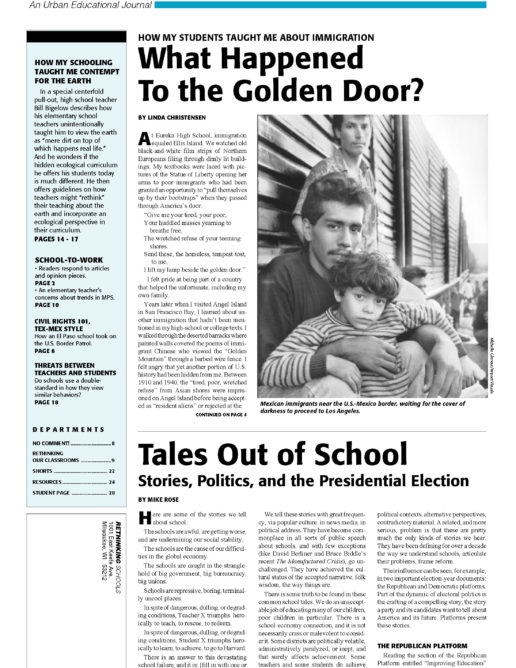Preview of Article:
To Sell or To Be Sold – Is That Really the Question?
An Elementary Teacher’s Concerns About School to Work
As I continued reading the newspaper, I stumbled upon another reference to banks, this time in an article about riots in Jordan over the doubling of bread prices. Some 40 people were injured in the protests, the worst in Jordan since 1989, and banks and government buildings were set on fire. Bread is a staple of the Jordanian diet, and protests erupted when bread prices doubled and prices of more than 20 other food staples increased as part of an economic plan supervised by the International Monetary Fund. The IMF and the World Bank, U.S.-dominated financial institutions, have increasingly intervened in Third World economies and “redirected” policies to bring them in line with market-oriented practices despite often severe social repercussions in countries such as Jordan, where the annual per capita income is only $1,100 and where the government had helped subsidize the price of food staples. Again, I wondered if children in school to work programs are given a glimpse of the controversial role of banks internationally, particularly in Third World countries.
Before I go any further, let me underscore that I think children should learn about banks and financial institutions. Furthermore, there are important skills that students can learn by running a bank or store including computational, social, and problem-solving skills. By and large, I support the goals of the Milwaukee school to work initiative, despite questions about its implementation. Establishing deeper connections between schools and our community, including our business community, is essential.
What worries me is the trend I see in elementary schools toward an uncritical, one-sided approach to teaching about influential institutions such as banks. Does entering a partnership mean we must blind ourselves to the often contradictory, sometimes harmful role that powerful institutions play? Are we teaching children about the world or about the world according to business? If students are taught only the benevolent aspects of banking, they might think that financial institutions have no connection with discrimination, impoverishment, or outright fraud (remember the S & L scandal, which cost U.S. taxpayers hundreds of billions of dollars?).
As part of school to work, students should be encouraged to step back and look at the totality of how businesses function and to examine their policies good and bad not only in terms of making money, but in terms of their workers, consumers, the community, and the environment.
What’s Going On?
My concern about how banking is one-sidedly portrayed to many MPS students is tied to a larger anxiety about the direction of school to work nationally.
In some districts, school to work has limited, business-driven goals that emphasize preparing kids for jobs. One would not expect such programs to be concerned with developing critical thinking skills among their students. But Milwaukee has gained a national reputation for its attempts to move beyond a narrow school to work agenda and to use the initiative to revamp school curricula, particularly in those high school classes where students were forced to study material that had little connection to the real world and that, by most accounts, was incredibly boring.

